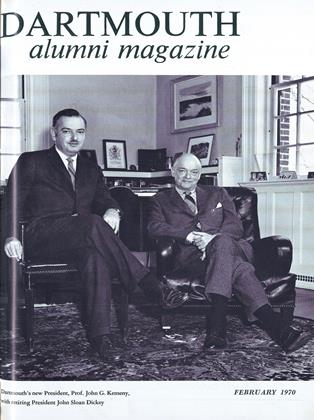Apollo 12 had a special significance for WILLIAM B. HEROY JR. '37. The seismometers placed on the moon were manufactured by Teledyne, Inc., where he is Assistant to the President, and the development of these sensitive measuring devices "represents the biggest chunk" in his professional life as a geologist.
After earning a Ph.D. at Princeton, Bill Heroy began his career in 1941 as an exploratory geologist in the Southwest. In 1945 he joined his geologist father in the Geotechnical Corporation, headquartered in Dallas, and supervised geophysical explorations in this country and Canada. As Geotech became more involved in the development of seismological instruments used in geophysical exploration, Bill's field work was curtailed.
In the fifties Geotech's sensitive instruments for recording earth tremors took on special importance as this country sought an accommodation with Russia on a nuclear-test ban. As a member of the Birkner Panel, Heroy provided President Eisenhower with technical information on how well seismometers could detect nuclear blasts. Next came Project Vela-Uniform, and Geotech with Bill now as president received more than $50 million in government contracts to develop improved methods of detecting nuclear tests. The success of this research enabled the United States to sign the Nuclear Test Ban Treaty in 1963 banning nuclear testing in the atmosphere. But can Geotech's instruments detect underground nuclear tests as well as atmospheric tests? Bill replies, "They aren't 100 percent yet, but awfully close to it. So close that it wouldn't pay to cheat." Now these seismographs are also measuring moon tremors.
Heroy is no longer so closely involved with the development of geophysical instruments, for in 1966 Geotech sold out to Teledyne, Inc., a large acquisition corporation. As assistant to the president of Teledyne, he is more concerned with long-range planning and coordinating the research programs of the 125 small companies that make up the parent corporation. Like most geologists, he thinks fondly of the days when he was less office-bound and could concentrate on exploration in the field.
Active in many geological and scientific associations, Bill was recently elected a Councilor of the Geological Society of America. Serving three-year terms, the Councilors direct the operations of the GSA, perhaps the most scholarly of the geological organizations and, Bill adds, "the only group I'm associated with that has any money."
His professional prominence was further recognized this past year when he was elected president of the American Geological Institute, which represents seventeen geological societies with more than 30 thousand members. In Washington the AGI represents the geologists' point of view on public issues and works with government in the development of policies or agencies relating to geologists. As president of the AGI, Bill tried to get the federal government to develop a national mineral policy for the first time. "On the one hand we have the conservationists, and on the other, we have to be realistic. Our plentiful way of life is the result of our being able to take minerals out of the ground. It's important to set down the rules."
In Dallas, where he makes his home, Bill Heroy serves as chairman of the education committee for the Chamber of Commerce and spearheaded a movement to get a county junior college system started and a branch of the University of Texas established in Dallas. He also has been a leader in a successful citizens' movement to reform the public school system in Dallas.
What about the quality of geological education at Dartmouth? Bill replies enthusiastically, "They're still teaching at Dartmouth!" He points out that many geology departments in other colleges have lost sight of their primary function of teaching. He has often been back to Dartmouth to lecture to geology classes, and in 1963 he joined with Geotech and the National Science Foundation to present a seismograph to the geology department. His ties to Dartmouth are reinforced by two Dartmouth sons, Bard '62 and Dave '64. He has served two terms on the Alumni Council as representative from the Southwest, and currently he is a member of the Major Gifts Committee for the Third Century Fund.
 View Full Issue
View Full Issue
More From This Issue
-
 Feature
FeatureFrom the Primate Patrimony To the Fellowship of Flowers
February 1970 By JAMES W. FERNANDEZ, -
 Feature
FeatureThe Pros and Cons of Coeducation
February 1970 -
 Feature
FeatureSpeaking of Books
February 1970 By FRANCIS BROWN '25, -
 Feature
FeaturePROF. JOHN G. KEMENY CHOSEN AS DARTMOUTH'S 13TH PRESIDENT
February 1970 -
 Article
ArticleThe Undergraduate Chair
February 1970 By WINTHROP A. ROCKWELL '70 -
 Class Notes
Class Notes1918
February 1970 By EDMUND H. BOOTH, DONALD L. BARR
Article
-
 Article
ArticleElected Governor of Granite State
December 1948 -
 Article
ArticleAlumni Articles
FEBRUARY 1968 -
 Article
ArticleGive a Rouse
APRIL 1986 -
 Article
ArticleNOVEMBER SCHEDULE
NOVEMBER 1962 By DAVE ORR '57 -
 Article
ArticleTuck School
April 1948 By H. L. DUNCOMBE JR. -
 Article
ArticleThe Undergraduate Chair
August 1942 By Walter Powers Jr. '43

